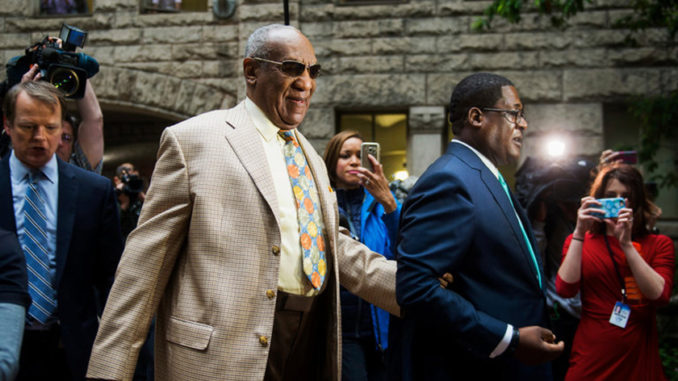
Story by Stacy M. Brown
NNPA Newswire Contributor
PITTSBURGH—After a third day of the jury selection process Bill Cosby criminal trial, all 12 jurors have been chosen. It was a day filled with high-drama and even several outbursts of laughter by the embattled comedian and others.
Also, six alternate jurors were chosen for the trial that’s scheduled to begin on June 5 in Montgomery County, Pennsylvania, about 300 miles from where the selection process took place.
Two members of the primary panel are African-American, a man and a woman both in their 30s or 40s. A male Black in his 20s and a female African-American in her 20s were also selected as alternates.
While the primary panel consists of 10 Whites—seven men and three women—the alternate jury pool includes four Whites.
In a telephone interview Wednesday, civil rights activist, Rev. Jesse Jackson said juror suppression has been a tool of the United States justice system for centuries.
“The jury may determine the outcome even before coming to court,” Jackson said. “Our history includes the killers of Emmett Till and Medgar Evers; a jury set those killers free. There’s a court bias and African-Americans don’t have access to the jury pool [like Whites].”
Cosby has been charged with three counts of sexual assault, which stem from an alleged incident more than a decade ago at his home near Philadelphia.
The star faces 10 years in prison if he’s convicted.
After Cosby’s legal team objected on Tuesday to prosecutors striking an African-American woman, an otherwise quiet proceeding grew contentious.
“We believe this is systematic exclusion of African-Americans,” defense lawyer Brian McMonagle complained in lodging the challenge to the striking of the juror and citing a legal term known as a “Batson challenge.”
According to the Legal Information Institute (LII) at the Cornell Law School, a Baston challenge is, “An objection to the validity of a peremptory challenge, on grounds that the other party used it to exclude a potential juror based on race, ethnicity, or sex. The result of a Batson challenge may be a new trial.”
The LII continued: “The name comes from Batson v. Kentucky, 476 U.S. 79 (1986) – which held this type of peremptory challenge to be unconstitutional when used by criminal prosecutors. Another case, Edmonson v. Leesville Concrete, 500 U.S. 614 (1991), permitted private litigants in a civil case to successfully make the same kind of objection.”
On Wednesday, drama filled the courtroom when a potential juror admitted to posting a note on Facebook and communicating with someone, who identified themselves as a seated juror. Judge Steven O’Neill, visibly angry, repeatedly asked the man whether the person in question was really a seated juror and whether he or she was in the jury room.
O’Neill then retreated to his chambers with attorneys from both sides and, after 40 minutes, reemerged to say that juror no. 2 had been dismissed, because of a personal issue.
It’s not known whether the already seated juror was the individual who traded Facebook posts. The judge had previously made it clear that jurors were not to post anything about the case or whether they were selected on social media or anywhere else.
Recommended For You.



Be the first to comment